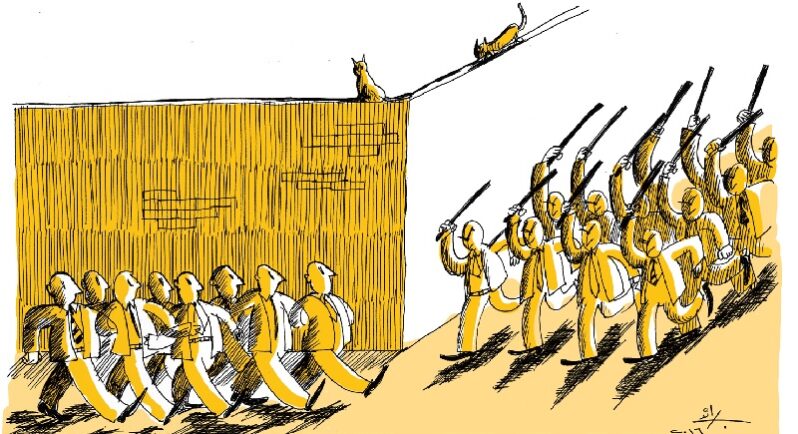Egypt’s Personal Status Bill: Appeasing al-Azhar?

On 20 January 2021, the Egyptian Council of Ministers approved its bill for a new personal status law once and for all. On February 15, Prime Minister Mostafa Madbouly sent the bill to Parliament Speaker Hanafy El Gebaly, who referred it to the relevant committees for study (the Constitutional and Legislative Affairs Committee, the Social Solidarity Committee, and the Religious Affairs and Endowments Committee). The law comprises 194 articles regulating marriage and its termination divided into seven chapters.
A Bill Without Social Debate
Under Article 122 of the Constitution, the government may submit bills to Parliament for debate, amendment, and a vote. However, such bills are not a government secret only disclosable to the relevant state institutions. President of the Egyptian Women’s Revolt Against Family Law campaign Minna Wahid says, “When we learned of a new personal status law submitted by the Ministry of Justice to the Council of Ministers, we went to the council and objections to the law were submitted. The people were told that they would be summoned for discussion”. Such discussion never occurred. She adds, “We began to learn of some of the law’s clauses, which we found did not improve the situation or meet the demands of fathers and families; rather, the amendments made matters worse”.
On March 4, over 300 women’s organizations, public figures, and jurists issued a statement against the government’s bill. The statement cited the government’s policy of refusing to conduct a social dialog before drafting its bills. It described the bill as “drafted in the shadows and behind the back of civil society, particularly women’s and rights organizations” as part of a “deliberate policy that all governments and parliaments have followed over the last seven years with regard to all vital bills concerning the evolution of Egyptian society”.
The Bill’s Main Aspects
Repositioning Paternal Custody and Introducing a Father’s Right to Host His Children
The bill revises the position of the father in the list of people entitled to child custody. Article 89 establishes the following order of precedence: the mother, the maternal grandmother, the paternal grandmother, and then the father. It thereby advances the father from the sixteenth position to the fourth position in one go. The explanatory memorandum, which we managed to obtain, justified this advancement as an attempt to avoid “problems that have in reality caused many children psychological and social harm because they do not know their fathers and their fathers’ families”. Hence, the bill addresses this issue not from the standpoint of the child’s best interest but through a stereotype that many men propagate, namely that their children do not know them because of their low position in the order of custody. This stereotype disregards many important factors impacting fathers’ relationships with custodial women, such as their compliance with child support and payment of their children’s education and medical treatment expenses, and some men’s deliberate attempt to change their children’s schools to lower quality ones just to spite the custodial women.
This amendment is also not based on summaries of meetings with focus groups of fathers and custodial women, conferences that involved civil society organizations and women’s associations, or the opinions of experts in children’s upbringing, education, and mental health. Rather, it is based on “the Islamic Research Academy’s decisions and recommendations approving the contents of the Jurisprudential Research Committee’s memorandum in its second sitting of session 44 on 27 September 2007”, according to the explanatory memorandum. Hence, the amendment is an echo of a 14-year-old proposal by al-Azhar’s Islamic Research Academy to accommodate the religious jurisprudential aspect rather than a product of current legal and social research targeting the child’s interests.
Article 91 of the bill establishes, for the first time, grandparents’ right to visitation when the parents are in the picture. In contrast, Article 20 of the current law only stipulates this right in the case that the parents are not in the picture.[1] This humane proposal undoubtedly accords with children’s interest, satisfies grandparents’ need for contact with their grandchildren, and underscores the importance of children’s contact with all family members. It also accords with the Supreme Constitutional Court’s 2013 ruling holding that the aforementioned Article 20 is unconstitutional and that “both grandfathers and grandmothers may see their grandchildren, even when the parents are in the picture”.[2]
The Crime of Abduction
The importance of fathers’ right to host their children, and its practical necessity when it comes to contact between them, is undebatable. However, the bill ignores the biggest issue causing custodial mothers to be troubled by the notion of hosting that it proposes, namely the crime of paternal abduction and the tragedies it inflicts on them. The bill establishes no solutions to this problem, such as increasing the crime’s punishment. While Article 289 of the Penal Code stipulates that, “Whoever abducts a child without trickery or coercion shall be punished with at least ten years of rigorous imprisonment”, the law does not treat the crime of paternal abduction as seriously. Egyptian law contains no recognition of the crime of “child abduction by the father”. Rather, Article 292 of the Penal Code refers to the crime of “failing to surrender the child”, indicating that the legislator does not consider such crimes to be abduction.[3] The punishment – no more than one year of imprisonment – reflects leniency toward fathers in keeping with the culture of refusing to label fathers’ retention of their children abduction. Hence, by proposing the right to host without addressing the issues of paternal abduction, the bill provides an inadequate remedy.
As for child support, which fathers sometimes refuse to pay, Paragraph E of Article 91 attempts to solve this problem by rendering loss of the right to host a consequence of failure to pay. However, the article concludes with the phrase “without an acceptable excuse”, thereby opening the door widely for concocted arguments and excuses in a manner that could deprive the article of its substance.
The Continuation of Verbal Divorce
In 2017, President Abdel Fattah el-Sisi raised the issue of verbal divorce during his Police Day speech, linking it to the rise in divorce rates per the Central Agency for Public Mobilization and Statistics. He proposed abolishing verbal divorce and compelling spouses to divorce before an officiant. Al-Azhar’s Council of Senior Scholars, presided over by Grand Imam Ahmed el-Tayeb, categorically rejected this proposal in a statement on 5 February 2017. Conversely, the proposal was supported by the National Council for Women, which implored the government and Parliament to present “a bill stipulating that spouses be considered divorced in official documents only from the date of certification”. Al-Azhar, and behind it Dar al-Ifta, maintained their opposition. In a government backslide, the new personal status bill accords with the official religious institutions’ view, recognizing verbal divorce in Article 46.
Verbal divorce is one of the most important issues affecting Egyptian women. A man can unilaterally divorce a woman verbally and then procrastinate and deny the divorce before the officiant or judicial authorities. Consequently, the woman finds herself in a legal, religious, and social predicament. According to the official religious institutions, divorce has occurred, whereas the law only recognizes proof of divorce in the form of witness testimony, writing, or the husband’s recognition, which is difficult to prove as verbal divorce usually occurs in private or over the phone. Under Article 21 of Law no. 1 of 2000, when a husband denies that a verbal divorce occurred, the woman can only prove it via witnesses and writing, not via the other legally stipulated means of proof. However, in 2006 the Supreme Constitutional Court ruled this text unconstitutional.[4] On that basis, women gained the right to prove verbal divorce via all legally stipulated means of proof.
The Right of a Woman’s Wali to Cancel Her Marriage
The bill confirmed a woman’s right to enter a marriage contract by herself and without a wali [a male guardian, e.g. her father or brother, pl. awliya] from the age of 18.[5] However, it promptly deprived this right of its substance by stipulating, in Paragraph B of the same article, that, “The wali shall have the right to legally request dissolution of the marriage before consummation within one year of learning about it or of the date that it was contracted – whichever comes sooner – if the woman marries herself to someone unworthy [ghayr kuf’] or without mahr al-mithl [standard dower for a woman of her status], provided that she is not pregnant and has not delivered children”.
This text is unjustifiably harsh as it determines that a woman, whatever her age, education, or professional ability, lacks the competence to marry whomever she wants without impediment by one of her awliya – who could be younger, of lesser mind, or less professionally accomplished – for no reason other than that he is male. Moreover, the article conflicts with Article 11 of the Constitution, which guarantees equality between men and women.[6] It reflects the bill’s ideological underpinnings and the legislator’s view of women.
Polygyny Not a Cause for Fault-Based Divorce
The bill explicitly recognizes a man’s right to marry four women. Accordingly, it repeats Article 11 bis of the current law, which states that, “The husband must acknowledge his marital status in the marriage document”. The bill adds a punishment of “one year of imprisonment and a fine ranging from EGP20,000 to 50,000 [USD1,280 to 3,190]” for violating this article.
Hence, the bill’s presenters do not deem marriage to another woman in and of itself grounds for a woman to file for a fault-based divorce [talaq li-l-darar] under Article 6 of Law no. 25 of 1929. This view accords with the official religious institutions’ view of polygyny as insufficient reason for the first wife to allege damage. Even the Constitutional Court has upheld this view.[7] This it did despite acknowledging, in another paragraph of the same ruling, “the harm arising from feelings simmering in the woman’s heart toward her co-wife” and that “the source of the potential animosity between them and their mutual resentment that extends to their children is the natural jealousy between two women competing for one man not devoted to either of them – a jealousy of which human souls cannot be cleansed”.
The court’s interpretation naturally results in a severe injustice against women and their right to mental wellbeing, one that inevitably impacts the stability of the marriage, the affection and compassion shared by the couple, and their children.
Family Court Jurisdiction over Movable Marital Assets
Dissipation of movable marital assets is one of the main cases that spouses file against each other both during marriage and in the event of divorce. To resolve this issue, the bill proposes that “the movable assets of the marital home shall be the wife’s private property unless agreed otherwise, and the Family Court shall have exclusive jurisdiction over all disputes concerning them”. Hence, claims alleging dissipation of marital movables fall under the jurisdiction of the civil courts rather than the criminal courts, as is currently the case. This is an unsuccessful attempt to solve the problem as such claims are one of women’s most important sources of strength that helps them to preserve the balance of power between them and men in family law cases. Because of the danger of custodial sentences and the social and legal effect of their presence in a person’s criminal record, many men are forced to reach consensual agreements on all subjects of dispute in the courts, such as child support, alimony, and education expenses. Hence, the withdrawal of such claims from the criminal courts’ jurisdiction creates a power imbalance between men and women in family law disputes, especially as movable marital assets fall under Article 341 of the Penal Code but actually collecting them is another matter.
Conclusion
The government’s personal status bill has disappointed women who were hoping for a unified, modern law to solve many of their problems in the personal status laws, such as polygyny, verbal divorce, and proving paternity. The bill even imposes a new limit on women’s competence by granting each of her awliya the right to dissolve her marriage via the judiciary if she marries someone unworthy.
A bill on the personal status of millions of male and female citizens naturally requires a degree of flexibility and compromise between the civil reforms demanded by many men and women and the official religious institutions’ jurisprudential opinions. However, the government opted to clearly favor the latter in a manner that ends any aspiration or hope for a civil personal status law in Egypt. The explanatory memorandum declares that the bill seeks to “codify many Islamic Law precepts”, leaving no room for modern jurisprudence on many pressing personal status issues.
This article is an edited translation from Arabic.
Keywords: Egypt, Personal status law, Paternal custody, Verbal divorce, Paternal abduction, Women’s rights, al-Azhar, Marital assets, Polygyny
[1] Law no. 25 of 1929.
[2] Supreme Constitutional Court Case no. 37 of Constitutional Judicial Year 33, published in the Official Gazette on 26 May 2013, is. 21 bis.
[3] Article 292 stipulates,
“Any parent or grandparent who does not surrender his child or child’s child to whoever has the right to claim the child based on a judicial custody order shall be punished with up to a year of imprisonment or a fine of up to EGP500 [USD32]”.
[4] Claim no. 113 of Constitutional Judicial Year 26.
[5] Article 6 of the bill.
[6] Article 11 stipulates, “The state shall ensure that equality is achieved between women and men in all civil, political, economic, social, and cultural rights”.
[7] Supreme Constitutional Court Case no. 35 of Constitutional Judicial Year 9.



